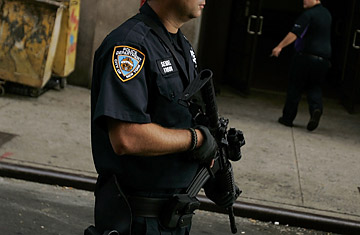
A police officer keeps watch on a street in New York City
The New York City Police Department is the largest — and one of the oldest — police forces in the United States. It's familiar around the world through depictions in TV and movies, and since Sept. 11, 2001, it has been revered for the bravery and sacrifices of its officers. It's also a secretive organization fraught with corruption, misconduct and a dangerous lack of public accountability, argues reporter Leonard Levitt in his new book, NYPD Confidential. A former TIME reporter, Levitt wrote a New York Newsday column about the department for 11 years, once so angering police commissioner Ray Kelly that Kelly traveled to the newspaper's Long Island headquarters to complain in person to Levitt's editors. Levitt spoke with TIME about the department's need for reform, the "cloak of Sept. 11" and the flawed leadership at One Police Plaza.
Even people who don't live in New York City feel familiar with the department, thanks to shows like NYPD Blue and the ubiquitous logo on hats and T-shirts. What are some things they may not know?
It's truly one of the great institutions in the world. There's very little they cannot do when they set their minds to it. The "Son of Sam" serial-killer case was solved by real detective work. They landed helicopters on the roof of the World Trade Center in 1993 to rescue victims after the bombing. But at the same time, it is a deeply flawed institution, beginning with the leadership of the department and leadership at City Hall. There are egos that are out of control, and there's very little or no civilian accountability.
You say that most of the media is still in a "post-9/11 swoon" and doesn't cover the department with any teeth.
It really happened even earlier, with the age of Giuliani and his turnaround of the crime situation. People were so afraid of getting on the wrong side of him that there was very little critical coverage at the time, so it all came out in the coverage of Louima and Diallo, which are two of the most horrific incidents that occurred. [Abner Louima is a Haitian immigrant who was brutally assaulted by a police officer in a Brooklyn precinct house in 1997. Amadou Diallo was an unarmed Guinean immigrant killed by police in 1999 in a hail of 41 bullets.] In terms of transparency or accountability, there's even less now under Mayor Bloomberg and Commissioner Kelly. The media is so cowed by Commissioner Kelly that there is no critical reporting of the police department whatsoever.
It's interesting you say that, because on first blush this appears to be a relatively strong period for the NYPD. Crime remains fairly low, and we haven't seen some of the tensions between the department and the public that we saw in the 1990s.
This is more style than it is substance. There have been four killings of unarmed black men by police since Kelly has been commissioner, and there's been no reform of police procedure that I'm aware of. We had the case of a black teenage boy shot to death on the roof of his apartment — the officer was patrolling with his gun drawn and accidentally shot him. Has there ever been any discussion of whether officers should be patrolling with their guns drawn in city housing projects? The police commissioner is very skillful, as is the mayor, at distracting the public without making any fundamental reform.
Mayor Giuliani often gets credit for the dramatic drop in New York's crime since the 1990s. Does he deserve it?
I think so. It wouldn't have happened without Giuliani. He had a commissioner [William Bratton] that changed the culture of the NYPD and made them accountable for the first time in perhaps a decade, but Giuliani was unable to share credit and Bratton was dismissed. Bratton, in my opinion, was not blameless either. He couldn't control himself when it came to publicity.
